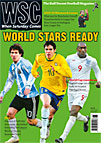 Ian Plenderleith examines a philosophical approach to the game which could make watching international football more bearable for England fans
Ian Plenderleith examines a philosophical approach to the game which could make watching international football more bearable for England fans
As we approach the World Cup and lose all sense of proportion about football’s importance, it’s worth asking just why we follow the game at all. A column by Andrew Guest at pitchinvasion.net asked a pertinent hypothetical question: If England win the World Cup, will their fans be any happier one year from now than if they had been knocked out in the second round by a goal that Carlos Tevez surreptitiously bundled in with his fist?
The piece cites a study comparing the happiness of lottery winners with people paralysed in an accident. After the initial euphoria of winning, or despair at being crippled, emotions evened out as lottery winners coped with false friends and the realisation that wealth is not fulfilling in itself, while those suddenly handicapped regained a sense of existential worth and a decent quality of life. One year on, their general happiness was around about equal.
Guest draws a parallel with football, where emotions are concentrated and transient, and suggests that it’s actually easier to cope with an early exit than losing in the final because fans “wouldn’t have to torment themselves with how close they came to winning it all”. Another study of Olympic athletes showed bronze medal winners were generally better pleased with their performance than silver medallists – third-place athletes compare themselves favourably with non-medallists, while silver medallists agonise over how close they came to picking up gold.
Yet more psychologists have deemed that football brings the greatest happiness when several people are gathered watching it together, regardless of the result. “Ultimately,” concludes Guest, “where else other than the sports arena can grown men cry, hug, sing, and dance in a way that enhances both their masculinity and their social networks? We often think soccer makes us happy when our team wins, but the evidence suggests it actually makes us happy by offering rare opportunities – real or perceived – to connect amid the penetrating anomie of modern life.”
So when we see fans celebrating their country’s World Cup win somewhere besides England, we can console ourselves that in a few months time they’ll be just as miserable as the rest of us. Never mind that whenever you talk to an Italian or an Argentine, they will joyously recount the nights of World Cup victories past when they danced wildly in the streets for days. In England it would probably rain anyway, and we’d all scurry indoors, or fall over drunk and sleep it off for 48 hours.
If football’s only point is allowing us to bond and sing and dance, then the debate over Inter’s victory over Barcelona in the semi-finals of the Champions League is irrelevant. Nonetheless, the blogosphere was rife with writers either condemning or hailing Jose Mourinho’s catenaccio revival. On footballfancast.com, Suminder Sandhu called Inter’s win “a victory for the ideals of the tactician”.
The case against Inter, Sandhu elaborated, was that their football was destructive, not entertaining. Yet, he continued, “Inter’s instructions, after deservingly beating Barcelona at the San Siro, was not to lose by more than one goal. They achieved their goal. Their manager’s tactics prevailed. Inter deserve their victory.” Mark Elkington at the Reuters Soccer Blog noted that: “Barça were as grey as Guardiola’s suit… and they seemed not to have a plan B when it became clear José Mourinho’s well-organised team were not going to let them play their way into the area with their intricate little passes.”
James Lawton, blogging for the Independent , spoke of how Barça coach Pep Guardiola’s “luminous vision of how the game should be played was so obscured by the masterpiece of stifling cynicism conjured by Mourinho”. This vague sense of melancholy at Barcelona’s defeat, combined with a begrudging nod towards Mourinho’s effective barricading, reflected the general tone of regret that a passing team blessed with flair had not been crowned European champions for the second year running. But according to our psychologists, Barcelona fans are no happier today for having won the Champions League last year. More importantly, they’ve spent a year dancing at all the glorious goals scored by Messi et al. The trophy is no more than a passive, barely relevant material object.
While on the context of football’s relative importance, Roberto Mancini ramped down the hype ahead of Man City’s most important game ever against Tottenham in the chase for fourth place. “It’s a football match – not a war,” he was quoted as saying on the Mirror’s website . Anyone would think he had half an eye on the Deepwater Horizon oil spill and the collapse of the Greek economy. He’s obviously not been in the country long enough to appreciate the historical and cultural significance of The Battle For Fourth Place.
Luton Town chairman Nick Owen said after his team’s fans attacked York City players following elimination from the Conference play-offs: “We’re not going to Wembley, but in many ways what’s more devastating is to see what happened on the pitch after the game.” Yes, the mass display of untrammelled aggression following the moronic inability to accept defeat was bad enough to make the game itself seem unimportant. Still, at least those grown men throwing bottles were, in a way, connecting with each other amid the penetrating anomie of modern life.
From WSC 280 June 2010